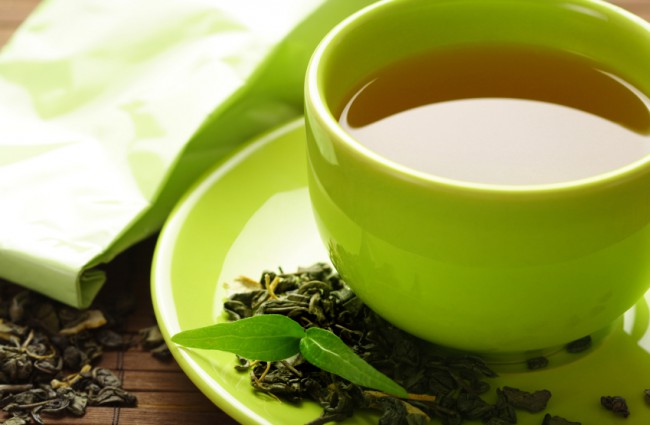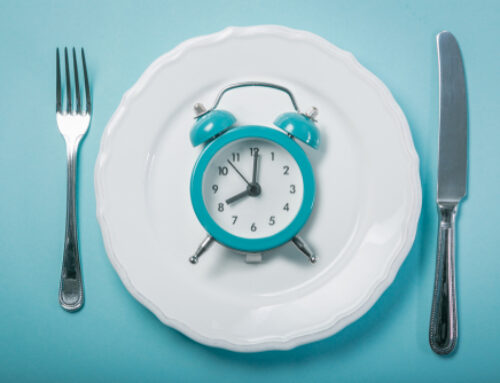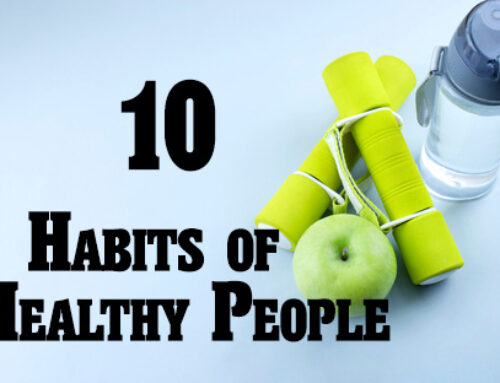How many comments have you heard regarding a failing metabolism? Popular opinion is that the metabolism slows down and quits all together after a certain age. That is simply not true. Age does play a factor in the efficiency of the metabolism. But there are specific ways to ensure your metabolism is working for you, not against you. In our previous installment, we examined the role of exercise in metabolism function:
- Don’t do cardio.
- Do high intensity training (HIT) or interval workouts.
- Do a single maximal effort sprint.
Today, we will look at the impact of diet on the metabolism:
1. Include protein at all meals.
Diets that contain high-quality protein at every meal promote leanness.” Protein foods” require the body to burn more calories to digest and absorb, than foods consisting of fat or carbohydrates. A meal of pure protein, for example, causes the body to burn nearly 25% of the calories provided in the protein just to digest and “use” the amino acids. In addition to the extra energy expenditure you get from high-protein meals, there are three other ways protein aids the achievement of optimal body composition:
- Protein builds muscle in the absence of exercise and the effect is enhanced when you pair it with smart training. Preserving lean muscle mass should be a primary goal when trying to lose body fat. The more muscle you have, the higher your metabolic rate.
- Protein is filling so you eat less. A review of the issue found that for every 1% increase in protein intake, people naturally decrease caloric intake between 32 and 51 calories daily.
- Protein helps manage blood sugar and insulin, decreasing cravings for higher carb foods.
2. Favor the highest quality, most digestible proteins.
All protein sources are not created equally. It is important to choose proteins that are nutrient-rich, easy to digest, and raise metabolic rate to a greater degree. Animal proteins tend to fulfill all three requirements. They are well digested if you chew them properly and have a healthy gut. They contain all the essential amino acids and a high concentration of non-essential aminos and other nutrients such as vitamin B12, the fat-soluble vitamins A, D, and K, creatine, leucine, and carnosine.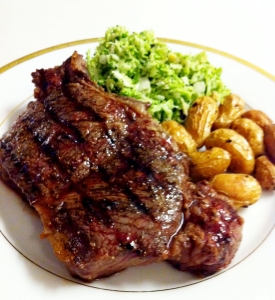
Animal proteins also tend to have a higher thermic effect than vegetarian protein sources. For example, whey protein raises energy expenditure much more than soy, casein, or rice protein. Beef, eggs, cod, salmon, and chicken have all performed well in metabolic studies, and each packs a potent concentration of satiating amino acids that have a high thermic effect. You might ask, “Does the superiority of animal proteins mean that vegetarian proteins should be avoided?” Definitely not! However, because the body can’t use vegetable-derived protein sources from beans, grains, and plants as efficiently as animal proteins, you have to eat more total protein to achieve the same physiological effects.
3. Pair high-thermogenic fats with protein: Omega-3 fats, nuts, and olive oil.
Certain fats stimulate thermogenesis just as protein does, but these cool fats do it in a unique way. Studies show they raise body temperature and lead to excess calories being burned. It is a similar mechanism to when your body burns more calories in the cold due to shivering. Research examples of the metabolic boost you can get from eating certain fats include the following:
- Overweight men who ate foods with a high omega-3 fat content, increased their caloric output by 920 calories during the 6-hour period after eating.
- Thermogenesis was 28% higher after a meal of walnuts, and 23% higher after a meal that favored monounsaturated fats from olive oil compared to a saturated fat-rich dairy meal.
4. Kick processed foods to the curb in favor of whole foods and plenty of vegetables.
Eating meals cooked at home from whole foods, such as vegetables, fruit, seeds, nuts, meat, and eggs have the power to raise the thermic effect by as much as 50% over highly processed foods like white bread and Velveeta® cheese. In one study, when participants ate a meal that contained more whole food ingredients, the thermic effect was double that of a processed food meal. More significant is that the participants who ate the processed food meal had their metabolic rates drop below their average basal metabolic rate (BMR) – the average energy needed to keep the body functioning at rest – during the sixth hour after eating. The whole food meal group never fell below the BMR. Processed ingredients have less fiber, requiring less enzyme production so they burn fewer calories. Additionally, there are two kinds of fiber and only the indigestible fiber that is supplied in plant foods is effective at raising energy expenditure. To benefit, include a large amount of green vegetables, cooked and cooled tubers, whole starches, and other high-fiber veggies in your meals.
5. Drink Green Tea.
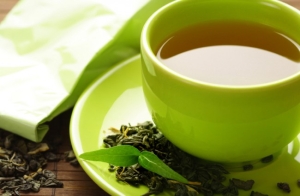 Green tea contains extremely high levels of the catechin antioxidants that raise energy expenditure and can promote fat loss. The catechins can also improve body composition by raising muscle mass and strength output when combined with exercise. Reviews of the metabolic effects of green tea agree that it can be beneficial, but there is no consensus about how much is necessary.
Green tea contains extremely high levels of the catechin antioxidants that raise energy expenditure and can promote fat loss. The catechins can also improve body composition by raising muscle mass and strength output when combined with exercise. Reviews of the metabolic effects of green tea agree that it can be beneficial, but there is no consensus about how much is necessary.
6. Cook with ginger and hot peppers.
Both ginger and hot peppers improve thermogenesis by raising body temperature and energy expenditure. They can reduce appetite, are antioxidant-rich, and pack a delicious spicy punch when cooked with leafy greens, meat,eggs, or pureed with post-workout protein drinks.
The first step in taking control of your health is becoming informed. Please do not let this list overwhelm you. Our
A New You in the New Year:
Thyroid Disorders and Boosting your Metabolism Class
January 15 @ 6pm
[LivFit] Nutrition and Exercise Seminar Series
February 12, 19, 26 @ 6pm
Sign up now at the front desk, or email us to reserve your spot!
For class updates, healthy tips, and office information, follow us on Facebook and Twitter
@CoreRoanoke.
Dr. Daryl Rich, DC, CSCS

